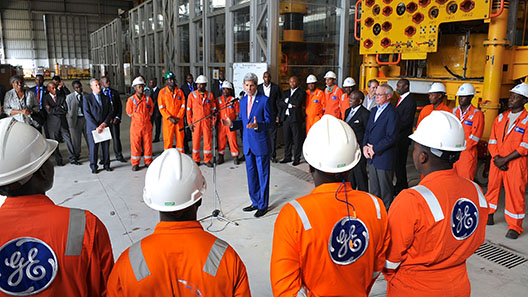New publication outlines lesser-known obstacles to US investment in Africa that will limit US companies’ success if left unaddressed.
Africa is no longer the home of small-time deals as companies strike billion-dollar game changers across the continent. With the buzz about “Africa Rising” having gone from the backroom to the boardroom, many multinationals are now taking a hard look at investing there. However, significant obstacles to investing in Africa remain beyond concerns of security and stability more commonly associated with Africa in the public imagination, according to “Investment and Ingenuity: Overcoming Obstacles to Doing Business in Sub-Saharan Africa,” a new Issue in Focus publication by the Atlantic Council.
Read the Issue in Focus (PDF)
Written by Aubrey Hruby, visiting fellow at the Atlantic Council’s Africa Center, the piece documents the obstacles to Western investment in the region and offers solutions for policymakers and business leaders. While commonly held concerns about Africa—political crises, security issues, and pervasive corruption—do factor into companies’ and funds’ consideration of African opportunities, the more serious obstacles impeding Western investment include:
- Inadequate infrastructure and small, land-locked markets: Due to Africa’s infrastructure gap and relatively high proportion of land-locked countries, the region struggles to attract manufacturing investment because it is more difficult and expensive to transport exports to global markets. Likewise, the continent’s fifty-four diverse and distinct economies add costly complexity and compliance obligations to firms operating locally.
- A lack of market data that leads to difficulty in accurately assessing risk: Businesses must be able to accurately assess and measure risk before they can mitigate it. The lack of traditional data sources poses a problem in Africa, including skewing assessment of risk toward stereotypes and historical sentiments. Additionally, Western firms have not developed the necessary market mindset to investing in African markets and are plagued by slow dissemination of lessons learned, sectoral silos, and a lack of the traditional consulting services.
- Poor policy implementation and execution by African governments: Policy uncertainty is one of the persistent and substantial obstacles to investment in African countries. If a firm is unsure of the rules that govern business in a particular sector, it cannot measure or mitigate risk properly. For the majority of African countries, having the right policies in place is not the problem, but rather the gap between execution, implementation, and enforcement that causes companies to hesitate in the face of rapid economic growth.
These obstacles have already slowed mainstream US investment in the region, and, if not properly addressed, will limit the success of US companies in Africa. They will also eventually act as a brake on critical African social development projects and job growth.
But these obstacles are not insurmountable. Hruby offers pragmatic solutions for policymakers and business leaders that address each of the challenges identified in the report, and argues that companies that adjust to the realities of frontier markets can find innovative solutions and reap high returns.
Image: US Secretary of State John Kerry and Angolan Minister of Foreign Affairs Georges Rebelo Pinto Chikoti meet with GE employees at the Port of Luanda. Photo: US Department of State.
